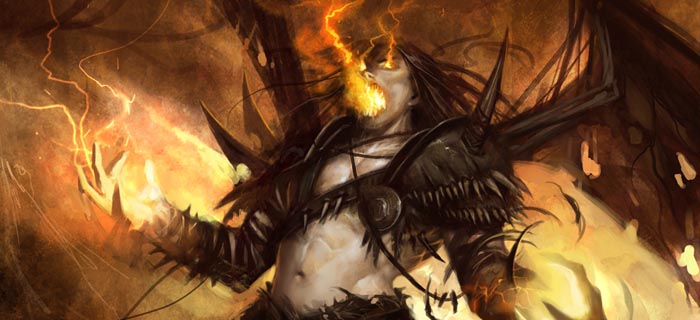Top 5 Gamer’s New Year Resolutions for 2011
With 2011 in view, it’s time to take a long, hard look at the nasty habits you’ve accumulated and take a solemn oath to change for the better, if only for the first two weeks of January. While I could use this space to talk about my own resolutions for the year, I don’t have any personal flaws. However, dear reader, you most certainly do. Let’s look at the top 5 ways you can become a better gamer and a better person as we jump into a brand new decade.
5. Stop Funding Kotick’s Activision
Look, I don’t want to exaggerate (it’s not my style), but every time you buy a game developed, published, or coughed on by Activision, Bobby Kotick drains the immortal soul out of a game developer. Loathed by gaming journalists the world over, Kotick’s Activision has purposely pushed our beloved hobby closer and closer to the kind of emotionless, vapid cesspool that already exists in Hollywood.
Do you like independent games? Games that challenge the norm in ways other than “lol now ur a terrorist”? Games for which the hard-working programmers and creatives who slaved over them get fair wages and humane working conditions? If you do, Bobby Kotick has a message for you:
Just kidding. Activision doesn’t have a message for you; instead, you and your like minded peers will be pushed to the periphery of gaming to make way for the infinite masses of unthinking 14-year olds who buy the newest COD because it exists and because, technically, it’s not considered selling your soul to the devil unless you hand your $60 directly to Bobby Kotick. But since life isn’t ruled completely by technicalities, its in the best interests of you and everyone you know to give your money to companies that are interested in pushing the industry forward, not dangling it over a sulfuric pit of $15 bullshit DLC.
4. Stop Pirating (Non-Activision) Games
I get it; games are expensive, and there are a lot of them. But for everyone who’s too young to remember the fate of the Sega Dreamcast, take heed: unlimited pirating has its tolls, namely horrific Digital Rights Management (DRM), and your favorite console/developers going the fuck out of business.
Of course, it’s not likely Nintendo, Microsoft, or Sony will be filing Chapter 11 bankruptcy any time soon, but it should come of no surprise to anyone that Ubisoft, Activision, and many other successful developers are instituting more-and-more intrusive DRM to combat perceived piracy problems. Want to play online? Sign into our secure server. Want to play single player? Sign into our secure server. Want to reinstall your game because Windows died? Okay, but only one more time. Want to play on a LAN? Go fuck yourself.
If you want to protest the price of games, pirating them helps, but only up to a point. After a certain amount of financial loss, these companies will use more mean-spirited DRM tactics to prevent piracy (hint: it won’t work), hindering legitimate players and increasing development costs. If you really want to protest $60 price tags for 4-hour games….
3. Stop Paying Full Price For Video Games
Here’s a little secret every gamer needs to know: only suckers pay $60 for games. Sure, 15 years ago, I lined up at a Funcoland (the predecessor to Gamestop) and paid $80 for Turok 2 on Nintendo 64. But that was 15 years ago, and Turok 2 was fucking sweet and totally worth it.
The point is, the market has changed. With eBay, Amazon, Gamestop, Best Buy, Craigslist, and a thousand other places competing for your precious, economy-stimulating dollars, there is always a deal on any given game, even brand new games. In other words, if you’re paying $60 for Assassin’s Creed 3 when it comes out, you’re doing it wrong.
Amazon offers store credit for buying games, essentially putting every game you buy there other than the first on permanent sale. K-Mart, Toys R US, and Gamestop have semi-annual Buy 1 Get 1 Free/Half Off sales. Craigslist and eBay are always great resources for bargain hunters, and as long as you’re not a total idiot, it’s easy to deal only with legitimate people.* Sites like Swap.com and Goozex.com can let you trade your existing games for reasonable prices (unlike Gamestop), with minimal processing fees. Cheap Ass Gamer and VG Pricecharts are also great for checking market trends and finding amazing deals.
Of course if you don’t have a credit card or you have a fear of the Internet and the kind of viruses blogs like this are currently installing on your computer, the easiest way to save money on games is to just wait a few months to buy them. Bayonetta is an A+ game with tons of content and replay value, which you can now buy for $12. It’s just as good as the day it came out for $60. Of course, if you wait too long it’s possible the game you’re buying will feel dated or will have lost its online community, but the biggest titles won’t be effected. I can guarantee you at least one person will be playing Gears of War 3 online four months after launch.
2. Expect More From Game Journalists
Let me ask you something… when was the last time you saw an interview video from E3 in which the person behind the camera asked a game developer something outside of “So, tell us why your game is awesome” or “This looks great, how much money will you let me give you for the collector’s edition?”
Where are the tough questions? The investigative reporting? The activities that aren’t directly related to fawning over the product? Despite the controversies that seem to pop up intermittently from the business side of gaming, it’s rare we see Kotaku or Gametrailers demanding accountability from game publishers and developers. Even rarer are interviews (or attempted interviews) with policy makers like the ESRB or members of Congress/Parliament/Abstergo.
While game journalism has come a long way, one thing it hasn’t developed is teeth. A game gets canned, and we get a press release. A new type of DRM is announced… and we get a press release. If we’re lucky, there’ll be some Q&A with Jack Thompson, but that’s more because he seeks out the spotlight, not because IGN is genuinely interested in things that don’t generate advertising revenue. If we expect gaming companies to produce better content in more ethical ways, we have to expect the gaming media to hold them accountable for their actions and to raise hell when they don’t.
What a great interview. I learned so much.
1. Save the Whining Until Release
When the Xbox Natal/Kinect was announced, the Internet produced a collective whine loud enough to deafen every Wii Sports soccer mom on the planet. Here was a device with so much potential paired with a legacy of motion-control horror stories. Sure enough, the launch trailers revealed a lineup of waggle nonsense, exercise me-too games, and animated pet tigers. It would have appeared the skeptics were right. Or were they?
Sure, the Kinect was a gimmick, but only weeks after launch, the PC hacker community has created dozens of amazing uses for the little 3D camera that could, from robotics control to holographic technology to shadow puppets. And it turns out that some of the Kinect games were actually fun, like Dance Central. What made Dance Central even more worthwhile was that it couldn’t have existed without the technology built into Kinect.
One of the first articles I wrote on Top Tier Tactics was about the ridiculous crying over the supposed god-tier status of Dudley in Super Street Fighter 4. Pre-release, everyone complained he had the game’s fastest overhead, ridiculous priority, and a safe launcher to Ultra combo setup. Yet when SSF4 actually released, Dudley was actually balanced. It turns out all the worrying and anti-hype was (surprise!) bullshit.
I understand that a lot of problems can be foreseen during development. And while Kinect has its place, it certainly hasn’t proven itself entirely worthwhile yet. But maybe, just maybe, we can save our uninformed Internet rage, store it in a convenient place, and release it at a more appropriate time, or for a more appropriate cause.
And if you are looking for things to be angry about, I heard that Wikileaks thing is a pretty big deal…
*Protip: The guy shipping from Hong Kong with zero positive ratings and a hot new copy of Call of Battlefield 3 is not legitimate.








MHO: Just a little tidbit to pirates. I understand the fact of doing it because it can be done, however, with Steam the prices for games are ridiculously low and a workaround for some DRM’s can take up to eight hours. And then with pirated copies your looking at viruses, and spyware. Now doing the math if your working already and the minimum wage is 7.75 an eight hour day would be 62 dollars. Is it worth it? I’d say no and my Steam account speaks for itself. Plus there’s tons of free games already online. What makes me mad (so mad I gave my store bought copy to a friend) is Ghost Recon Advanced Warfighter. I purchasedthe game, installed, and when I went to play it it sadi insert original disc. It took a reboot and four attempts to play it. GTA 4 is not any better (update it has gotten better now that you just have to log in to Windows Live instead of the “facebook” version of GTA server too, but at the beginning it wrecked my day). Happy New Year Top Tier gang and sorry for the rant.
I’m not sure using Swap.com is any better than pirating in the end. The result is the same, you aren’t giving the game makers money.
I’ve tried to compromise by paying for a game if I know I want it, and swapping to test others I’m uncertain of, but it can be hard.
A fair point, though I don’t feel bad IKEA didn’t get money when I bought my coffee table used.
There’s a difference though between a good which has a finite usage to a single person like a game and one with a continuous usage like a coffee table.
Once you finish the average game it’s kind of useless to you, so trading it away is more or less no different than it sitting on your shelf and not being played.
A coffee table has continual utility until it simply breaks, and that’s something someone else can’t utilize while you have it.
Another way to think about it. A game’s worth is effectively how much a single person will get out of it over the life span of the game, not how long the physical disc last. So say 10-40h for most games, and you can “circumvent” the system by letting someone else get the same value from the same physical item. A coffee tables value is measures in years, and once one person gains the ability to use it another looses it.
That viewpoint only works insofar as you believe that the availability of a game has no inherent value. I paid a lot of money for a used copy of Guardian Heroes on Sega Saturn. I don’t play the game often, but I have the option to play it at any given time. Does it have finite usage? Well, I’ve already played it hundreds of hours, yet I haven’t seen every ending to the game or used every character. I could say the same of half the games sitting on my shelf; will I ever reach the finite limit of things to do in Starcraft 2?
Look at something like a DVD player. It has no inherent value except when it is in use. Neither does a chess board, or a pair of glasses. I use my fine china 1-3 times a year, storing it in a closet the other 362 days. I could easily sell it or (less conventionally) lend it out.
That’s certainly valid. Though if anything I think you’ve hit on there being a spectrum of use from one-time to continuous which complicates the issue.
The average video game has a low usage time so it’s closer to the one-time side. A coffee table is more on the side of continuous use.
Something on the onetime side will likely be used once and then “thrown away” even if that means “sitting around unused forever”.
Something on the continuous side will have utility over time. While I personally don’t use my coffee table all the time. It is always holding things on and in it.
The games you mention fall somewhere in the middle and are likely good ways to attenuate the issue at hand. The more you make someone want to keep something the fewer used copies available and therefor the more likely someone else will just buy a new copy. I don’t think majority of games are in this category, nor should they necessarily be.
There’s a separate dimension in the one-use side in that some things are truly one use and others effectively one use. food is truly one use but a video game CAN be reused but most often it is not. So then the issue is how is it valued. I’d argue games are valued by the producer as much more one use than multiple use, and priced as such.
Maybe they’re actually valued as 1.5x due to replay or some factoring in of resale.
An analog is books. Most people don’t reread their books, yet they keep them around, so I would think they are priced in the single person usage model. If trading became more prevalent then perhaps they’d be priced more.
I agree that Cod’s DLC is over priced, and that people will buy it merely because its there, but Black Ops seems to be the best Cod so far. Sadly, its still ridiculously similar the the past games in the series.
[…] As seen on Top Tier Tactics. […]